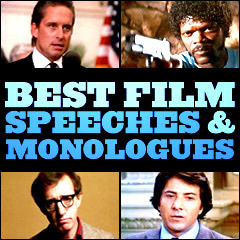|
Best Film Speeches and Monologues
|
|
Title Screen
|
Film Title/Year and Description of Film Speech/Monologue |
Screenshots
|

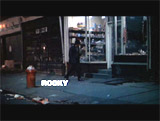
|
Rocky
(1976)
Screenwriter(s): Sylvester Stallone
 A
Fighter and a Boxing Trainer A
Fighter and a Boxing Trainer
At Rocky's meager apartment, his wily trainer
Mickey (Burgess Meredith) attempted to convince Rocky Balboa
(Sylvester Stallone) to accept him as his manager for his unlikely
title fight:
Well, what ya need is a manager. A manager,
listen to me. I know, because I've been in this racket
for fifty years...I've seen it all, all of it. Ya know
what I've done?...I have done it all...
Mick persisted: " I got all this knowledge,
I got it up here now, I wanna give it to you...I wanna take
care of ya, I wanna make sure that all this s-t that happened
to me doesn't happen to you...Ya can't buy what I'm gonna give
ya."
Rocky responded with a yelled tirade at a departing
Mickey as he descended the stairs - rejecting his offer of
experience, because he had been ignored over the
past ten years:
What about my prime, Mick? At least you
had a prime? I had no prime, I've had nothin'....
Then a few moments later, Rocky had a change
of heart and ran into the street to stop Mick.
They reconciled,
and he accepted Mick as his trainer - putting his arm around
him and shaking his hand (in an extreme long shot). |
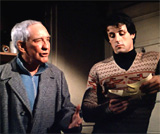
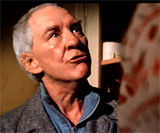
Mick's Offer to Help Rocky For His Upcoming Fight
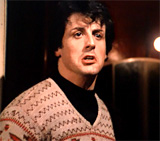
Rocky: "What about my prime, Mick?"
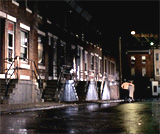
Reconciling with Mick at the End of the Street
|

|
Taxi
Driver (1976)
Screenwriter(s): Paul Schrader
 "All
the Animals Come Out at Night" "All
the Animals Come Out at Night"
Cab driver Travis Bickle (Robert DeNiro) wrote
in his diary as the camera panned across the interior of his
squalid, welfare-style, studio apartment. He made a rambling,
vitriolic opening monologue (delivered in voice-over) as he
read (or hallucinated) from his diary about his disgust at
the city:
May 10th. Thank God for the rain which has
helped wash away the garbage and the trash off the sidewalks.
I'm workin' long hours now. 6:00 in the afternoon to 6:00
in the morning, sometimes even 8:00 in the morning. Six
days a week, sometimes seven days a week. It's a long hustle,
but it keeps me real busy. I can take in 300, 350 a week,
sometimes even more when I do it off the meter.
All the animals come out at night - whores,
skunk pussies, buggers, queens, fairies, dopers, junkies.
Sick, venal. Someday a real rain'll come and wash all this
scum off the streets. I go all over. I take people to the
Bronx, Brooklyn, I take 'em to Harlem. I don't care. Don't
make no difference to me. It does to some. Some won't even
take spooks. Don't make no difference to me.
|
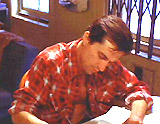

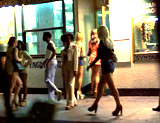
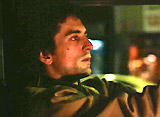
|

|
Taxi
Driver (1976)
Screenwriter(s): Paul Schrader
 A
Sick Taxi Passenger's Revenge ("You Think I'm Sick?") A
Sick Taxi Passenger's Revenge ("You Think I'm Sick?")
A taxi passenger (Martin Scorsese) made chilling,
shocking threats about killing his unfaithful wife:
You see the woman in the window? Do you see
the woman in the window?...I want you to see that woman,
because that's my wife. That's not my apartment. That's
not my apartment. You know who lives there? Huh? I mean,
you wouldn't know who lives there - I'm just sayin', but
you know who lives there? Huh? A nigger lives there. How
do ya like that? And I'm gonna, I'm gonna kill him...What
do you think of that? Hmm? I said, 'What do you think of
that?' Don't answer. You don't have to answer everything.
I'm gonna kill her. I'm gonna kill her with
a .44 Magnum pistol. A .44 Magnum pistol, I'm gonna kill
her with that gun. Did you ever see, did you ever see what
a .44 Magnum pistol can do to a woman's face? I mean it will
f---in' destroy it. Just blow her right apart. That's what
it will do to her face. Now, did you ever see what it can
do to a woman's pussy? That you should see. That you should
see what a .44 Magnum's gonna do to a woman's pussy you should
see. I know, I know you must think that I'm, you know, you
must think I'm pretty sick or somethin', you know, you must
think I'm pretty sick. Right? You must think I'm pretty sick?
Hmm? Right? I'll betcha, I'll betcha you really think I'm
sick, right? You think I'm sick? You think I'm sick? You
don't have to answer that. I'm payin' for the ride. You don't
have to answer that.
|
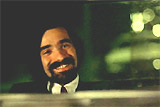
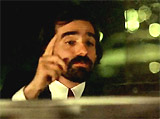
|

|
Taxi
Driver (1976)
Screenwriter(s): Paul Schrader
 "You
Talkin' To Me?" Monologue "You
Talkin' To Me?" Monologue

Play clip (excerpt): 
In his squalid walk-up apartment in front of
a mirror, taxi driver Travis Bickle (Robert DeNiro) belligerently
delivered (to the camera and an invisible make-believe adversary
or enemy) an indelible, much-imitated "You talkin' to
me?..."
scene as he practiced quick-drawing with his guns, ending with
the conclusion: "You're dead!":
Yeah. Huh? Huh? Huh? (I'm) faster than you,
you f--kin' son of a...I saw you comin', you f--k, s--t-heel.
I'm standin' here. You make the move. You make the move.
It's your move. (He drew his gun from his concealed
forearm holster.) Don't try it, you f--ker. You talkin'
to me? You talkin' to me? You talkin' to me? (He turned
around to look behind him.) Well, who the hell else
are you talkin' to? You talkin' to me? Well, I'm the only
one here. Who the f--k do you think you're talkin' to?
Oh yeah? Huh? OK.
He whipped out his gun again.
Huh? Listen you f--kers, you screwheads.
Here's a man who would not take it anymore. Who would not
let...Listen you f--kers, you screwheads. Here's a man
who would not take it anymore. A man who stood up against
the scum, the c--ts, the dogs, the filth, the s--t, here
is someone who stood up.
A close-up of his diary entry, "Here is," was
followed by three erratic dots.
HERE IS ---
He drew his gun.
You're dead.
|
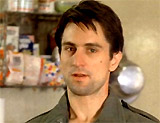
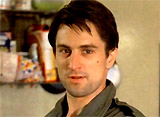
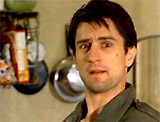
|
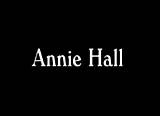
|
Annie
Hall (1977)
Screenwriter(s): Woody Allen, Marshall Brickman
 "How
I Feel About Life" - An Opening Monologue "How
I Feel About Life" - An Opening Monologue
Comedian Alvy Singer (Woody Allen) delivered
the film's opening monologue (composed of jokes about his relationships
with women and his mid-life crisis) told directly into the
camera. He mused about his breakup with Annie Hall (Diane Keaton)
after a year's relationship, before launching into a narrated
autobiography about his early childhood:
There's an old joke. Uhm, two elderly women
are at a Catskill Mountain resort. And one of 'em says:
'Boy, the food in this place is really terrible.' The other
one says: 'Yeah, I know. And such small portions.' Well,
that's essentially how I feel about life. Full of loneliness
and misery and suffering and unhappiness, and it's all
over much too quickly. The other important joke for me
is one that's usually attributed to Groucho Marx, but I
think it appears originally in Freud's Wit and Its
Relation to the Unconscious - and it goes like this.
I'm paraphrasing. Uhm, I would never want to belong to
any club that would have someone like me for a member.
That's the key joke of my adult life, in terms of my relationships
with women.
You know, lately, the strangest things have
been going through my mind, 'cause I turn 40, and I guess
I'm going through a life crisis or something. I don't know.
And I'm not worried about aging, I'm not one of those characters.
You know, although I'm balding slightly on top. That's about
the worst you can say about me. I, uhm, I think I'm gonna
get better as I get older. You know, I think I'm gonna be
the, the balding virile type, you know, as opposed to, say,
the uhm, distinguished gray, for instance, you know, unless
I'm neither of those two. Unless I'm one of those guys with
saliva dribbling out of his mouth who wanders into a cafeteria
with a shopping bag screaming about socialism.
Annie and I broke up. And I-I still can't get
my mind around that. You know, I keep sifting the pieces
of the relationship through my mind, and, and examining my
life and trying to figure out where did the screw-up come,
you know. And, a year ago, we were in love, you know. And,
and, and it's funny, I'm not a morose type. I'm not a depressive
character. I-I, uh, you know, I was a reasonably happy kid,
I guess, I was brought up in Brooklyn during World War Two.
|
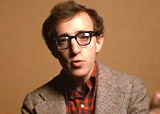
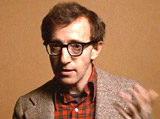
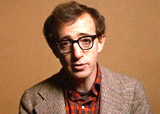
|

|
Annie
Hall (1977)
Screenwriter(s): Woody Allen, Marshall
Brickman
 A
"Cultural Stereotype" Assessment A
"Cultural Stereotype" Assessment
Backstage at an Adlai Stevenson political rally/fund-raiser
for the 1960 presidential candidate, seen in a flashback, aspiring
stand-up comedian Alvy (Woody Allen) provided a "cultural
stereotype" assessment of first wife-to-be Allison Portchnik
(Carol Kane). He insensitively classified and stereotyped Allison,
much like a bigot:
You're like a New York Jewish, Left-Wing,
Liberal Intellectual, Central Park West, Brandeis University,
the socialist summer camps, and the father with the Ben
Shahn drawings, right? Really, you know, strike-oriented,
kind of Red - Stop me before I make a complete imbecile
of myself!
She responded: "No, that was wonderful.
I love being reduced to a cultural stereotype." Alvy confessed
his leftist bigotry:
"Right, I'm a bigot, you know, but for the left." |
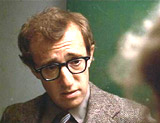

|

|
Annie
Hall (1977)
Screenwriter(s): Woody Allen, Marshall
Brickman
 Closing
Thoughts About Relationships Closing
Thoughts About Relationships
After their break-up, Annie (Diane Keaton) and
Alvy (Woody Allen) happened to meet after she had moved back
to the Upper West Side of Manhattan, and was living with another
guy in SoHo. Alvy presented a closing monologue, reminiscing
(with a montage of their happy times together) about his relationship
with her, and then on a street-corner (at West 63rd St.) (filmed
with a stationary camera), they said goodbye, shaking hands,
kissing, and parting in different directions. Alvy, after a
very long glance after her departing figure, turned away toward
solitude, his head bent down toward a lost future, as he delivered
a voice-over:
After that, it got pretty late and we both
had to go. But it was great seeing Annie again. And I realize
what a terrific person she was and how much fun it was
just knowing her. And I thought of that old joke. You know,
the, this, this guy goes to a psychiatrist and says, 'Doc,
uh, my brother's crazy. He thinks he's a chicken.' And
uh, the doctor says, 'Well, why don't you turn him in?'
And the guy says, 'I would, but I need the eggs.'
Well, I guess that's pretty much now how I
feel about relationships. You know, they're totally irrational
and crazy and absurd and - But uh, I guess we keep going
through it because most of us need the eggs.
|
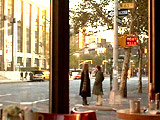

|
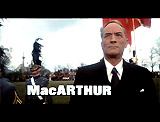
|
MacArthur
(1977)
Screenwriter(s): Hal Barwood, Matthew Robbins
 "Duty,
Honor, Country" "Duty,
Honor, Country"
Play clip (excerpt): 
General Douglas MacArthur (Gregory Peck) presented
his acceptance speech to West Point cadets on May 12, 1962
on the occasion of his receiving the Sylvanus Thayer Award:
Duty, Honor, Country. Those three hallowed
words reverently dictate what you ought to be, what you
can be, and what you will be. They are your rallying
points. They give you a temper of the will, a quality of
the imagination, a vigor of the emotions, a freshness of
the deep springs of life, a temperamental predominance
of courage over timidity, an appetite for adventure over
love of ease. In this way, they will teach you to be an
officer and a gentlemen. From your ranks come the great
captains who will hold the nation's destiny in their hands
the moment the war tocsin sounds. The Long Gray Line has
never failed us. Were you to do so, a million ghosts in
olive drab, in brown khaki, in blue and gray, would rise
from their white crosses thundering those magic words:
'Duty, Honor, Country.' This does not mean that you are
warmongers. On the contrary, the soldier, above all other
people, prays for peace, for he must suffer and bear the
deepest wounds and scars of war. But always in our minds
ring the ominous words of Plato: 'Only the dead have seen
the end of war.' ....The shadows are lengthening for me.
The twilight is here. My days of old have vanished in tone
and tint. They have gone glimmering through the dreams
of things that were. Their memory is one of wondrous beauty,
watered by tears, and coaxed and caressed by the smiles
of yesterday. I listen vainly, but with thirsty ear, for
the witching melody of faint bugles blowing reveille, of
far drums beating the long roll. In my dreams I hear the
crash of guns, the rattle of musketry, the strange, mournful
mutter of the battlefield. But, in the evening of my memory,
always I return to West Point. Always there echoes and
re-echoes: 'Duty, Honor, Country.' Today marks my final
roll call with you. I want you to know that when I cross
the river, my last conscious thoughts will be of The Corps,
and The Corps, and The Corps. I bid you farewell.
|

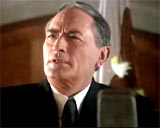
|

|
MacArthur
(1977)
Screenwriter(s): Hal Barwood, Matthew Robbins
 "I
Now Close My Military Career and Just Fade Away" Farewell "I
Now Close My Military Career and Just Fade Away" Farewell
Play clip (excerpt): 
Famed WWII US Army General Douglas MacArthur
(Gregory Peck) delivered his final farewell speech to a joint
session of Congress on April 19, 1951, often interrupted by
applause:
...But, once war has been forced upon us,
there is no other alternative than to apply every available
means to bring it to a swift end. War's very object is
victory, not prolonged indecision. In war, there can be
no substitute for victory. For history teaches us with
unmistakable emphasis that appeasement but begets new and
bloodier war. Like blackmail, it lays the basis for new
and increasingly greater demands until, as in blackmail,
violence becomes the only alternative. 'Why?' 'Why,' my
soldiers asked of me, 'surrender military advantages to
an enemy in the field?' I could not answer. The magnificence
of the courage and fortitude of the Korean people defies
description. They have chosen to risk death rather than
slavery. Their last words to me were: 'Don't scuttle the
Pacific.' I am closing my 52 years of military service.
When I joined the Army, even before the turn of the century,
it was the fulfillment of all of my boyish hopes and dreams.
The world has turned over many times since I took the oath
on the plain at West Point, and the hopes and dreams have
long since vanished. But I still remember the refrain of
one of the most popular barrack ballads of that day which
proclaimed most proudly that 'old soldiers never die, they
just fade away.' Like the old soldier of that ballad, I
now close my military career and just fade away, an old
soldier who tried to do his duty as God gave him the light
to see that duty. Goodbye.
|
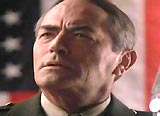
|

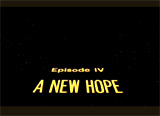
|
Star
Wars (1977)
Screenwriter(s): George Lucas
 "Help
me, Obi-Wan Kenobi; You're My Only Hope" "Help
me, Obi-Wan Kenobi; You're My Only Hope"
When young Luke Skywalker (Mark Hamill) was cleaning,
polishing and repairing the R2-D2 droid, he accidentally tripped
one of its switches, and the mechanical robot projected a three-dimensional
hologram into the middle of the room. It was a miniature image
of a beautiful girl, Princess Leia Organa (Carrie Fisher).
In a recording that played over and over, she pleaded for help
("Help me, Obi-Wan Kenobi. You're my only hope")
from wise and noble Jedi warrior/mentor Ben "Obi-Wan" Kenobi
(Sir Alec Guinness). However, it wasn't until later when Ben
was located that her entire holographic message could be played.
She told about how the stored secret Death Star
plans inside R2-D2 had to be delivered to her father on Alderaan,
in order for the Rebellion to survive against the evil Empire:
General Kenobi: Years ago, you served my
father in the Clone Wars. Now he begs you to help him in
his struggle against the Empire. I regret that I am unable
to present my father's request to you in person, but my
ship has fallen under attack and I'm afraid my mission
to bring you to Alderaan has failed. I've placed information
vital to the survival of the rebellion into the memory
systems of this R2 unit. My father will know how to retrieve
it. You must see this droid safely delivered to him on
Alderaan. This is our most desperate hour. Help me, Obi-Wan
Kenobi. You're my only hope.
|
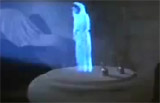

Princess Leia: "Help me, Obi-Wan Kenobi.
You're my only hope"
|
